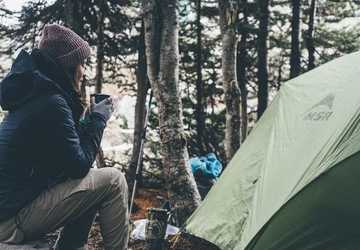Exploring the great outdoors is a rewarding experience, especially when you're doing it alone. The sense of freedom, peace, and adventure is unparalleled. However, venturing solo into the wilderness comes with its own set of challenges and risks. To ensure your journey is safe and enjoyable, we've compiled this comprehensive guide.
The Importance of Planning Ahead
Before setting out on your adventure, planning is crucial. Whether you're an experienced explorer or a novice, researching and preparing for your trip can make all the difference in your experience. One key aspect to consider is your destination and the specific risks it poses, such as wildlife, weather conditions, and terrain. Take advantage of the internet, travel books, and advice from fellow adventurers to enrich your solo wilderness travel guide.
A great starting point for your planning is to consult reliable resources. Websites, guidebooks, and forums dedicated to outdoor adventures can offer invaluable insights. Some resources even offer tailored tips for those looking into outdoor adventure solo tips. Maps and trail guides can also provide you with vital information like water sources and escape routes.
Knowing your own capabilities and limitations is essential when you're traveling alone safely. Don't overestimate your skills; instead, choose a destination that matches your skill level. The last thing you want is to find yourself in a situation you're not equipped to handle.

The right equipment is not only about convenience but is also a matter of safety. Your gear list will vary depending on your destination, weather conditions, and the length of your trip.
Common items you should not skip include a map and compass, a first-aid kit, a multi-tool, a flashlight, and enough food and water. Tailor your gear to suit your specific needs, but always prioritize the basics.
Technology has its place in outdoor exploration, too. GPS devices and emergency beacons can provide an extra layer of security. However, never solely rely on technology as it can fail. Always have a backup plan.
Safety should always be your top priority, especially when you're traveling alone safely. Understanding and adhering to some basic safety measures can significantly reduce risks.
Keep tabs on the weather forecast, and be aware of any warnings or advisories in the area. Your solo wilderness travel guide should also include emergency numbers and the nearest points for medical assistance.
Being knowledgeable about the wildlife in your chosen destination can be life-saving. Research the kinds of animals you might encounter and learn how to react if you cross paths with them. This is a crucial part of outdoor adventure solo tips.
While one of the appeals of solo travel is disconnecting from the daily grind, staying connected to some extent is advisable for safety reasons.
● Inform Someone: Always let a trusted person know your itinerary and when you expect to return. Regular check-ins can act as a safety net.
● Emergency Communication: In addition to your cell phone, consider carrying a satellite phone or an emergency beacon for areas with no cell reception.
Navigational Skills: A Must-Have
One aspect often overlooked in solo outdoor exploration is the importance of having good navigational skills. Whether you're trekking through a dense forest or scaling a mountain, the ability to read a map and use a compass is crucial. Even with GPS technology at your fingertips, traditional navigation skills offer a reliable fallback option. This is an indispensable component of traveling alone safely, as getting lost can quickly escalate into a life-threatening situation.
Practice Makes Perfect
Before embarking on your journey, take some time to practice reading topographical maps and using a compass. These skills may seem outdated in the age of smartphones, but they're ever-relevant. This practice should be an essential part of your solo wilderness travel guide preparation.
Nutritional Needs: Fueling the Adventure

Your body needs proper nutrition and hydration to function optimally, especially during physically demanding activities like hiking, climbing, or kayaking. Planning your meals is not just about satisfying your hunger; it's also about sustaining your energy levels throughout the adventure.
● Caloric Intake: When packing food, consider the caloric content and nutritional balance. High-energy foods like nuts and dried fruits are excellent for maintaining stamina. Preparing in this manner is a valuable outdoor adventure solo tip.
● Water Purification: Clean water is a must. Always carry enough water and have a way to purify more if needed. Water purification tablets, pumps, or ultraviolet sterilizers are good options to consider.
Mental Preparedness: The Unseen Gear
Often underestimated, mental preparation is just as important as physical readiness. The solitude and physical demands of the adventure can take a toll on your mind, making mental preparedness an essential part of traveling alone safely.
● Positive Mindset: Maintain a positive mindset, but also prepare for possible challenges. Visualization techniques and mindfulness practices can help bolster mental strength. Keeping your mind sharp is among the less spoken about but essential outdoor adventure solo tips.
Leave No Trace: Responsible Adventuring
One of the most critical aspects of outdoor exploration is to minimize your impact on the environment. The "Leave No Trace" principles are not just ethical guidelines but also laws in many places.
● Waste Management: Always carry reusable containers and bags to pack out your trash. Minimizing your waste not only protects the environment but also preserves the natural beauty for future adventurers. This is a principle that should be embedded in any solo wilderness travel guide.
● Respect Wildlife and Flora: Maintain a safe distance from wildlife and don't feed them, as human food can be harmful. Likewise, don't pick plants or remove rocks. Respect the natural habitat you're visiting.
Conclusion: The Ultimate Adventure Awaits
Embarking on a solo outdoor journey is a unique and rewarding experience. When well-planned and executed, it becomes an adventure of a lifetime. By adhering to safety precautions, gearing up appropriately, and taking care of both your body and mind, you are setting yourself up for success. This guide aims to serve as your comprehensive solo wilderness travel guide, filled with practical outdoor adventure solo tips designed to aid you in traveling alone safely. The world is your playground—explore responsibly and enjoy.